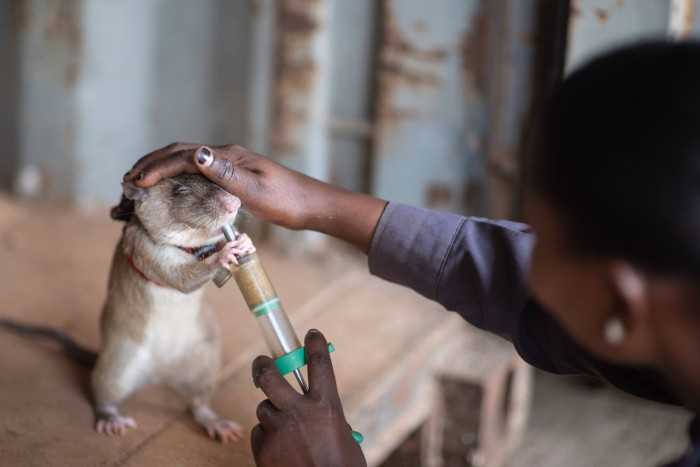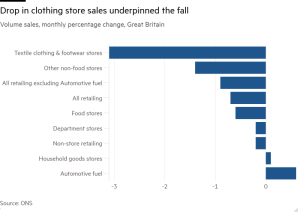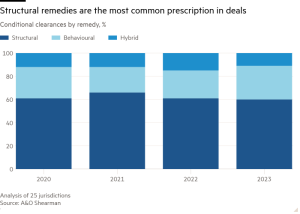Giant African rats join crackdown against illegal wildlife trade

Unlock the Editor’s Digest for free
Roula Khalaf, Editor of the FT, selects her favourite stories in this weekly newsletter.
Scientists have flipped the cliché of smelling a rat by training giant rodents to sniff out contraband from rhinoceros horns to pangolin scales, boosting the growing fight against the lucrative illegal wildlife trade.
The furry investigators performed well in two trials at a port in Dar es Salaam, Tanzania’s biggest city, and are now being prepared for a wider role inspecting warehouses and shipping containers. The deployment expands the use of the rodent sleuths in various roles, including uncovering threats from tuberculosis pathogens to landmines.
The trade in illegal wildlife products is worth up to $20bn a year, according to global police organisation Interpol, making it one of the world’s largest and most profitable illicit markets.
“Our study shows that we can train African giant pouched rats to detect illegally trafficked wildlife, even when it has been concealed among other substances,” said Isabelle Szott, a researcher at the Okeanos Foundation and co-author of a paper published on Wednesday in Frontiers in Conservation Science.
“The biggest advantages of the rats are their relatively short training time flexibility working with different trainers, and cost-effectiveness.”

African giant pouched rats — which can grow to almost 1 metre long nose to tail — were trained in several phases using rewards such as flavoured pellets. They started with learning to “nose poke” into a hole containing a target scent, such as elephant tusk or African blackwood.
Then they were taught to ignore other odours commonly used to hide contraband shipments, including electrical cables, coffee beans and washing powder.
The rats, which were coached at Tanzania-based animal training non-profit organisation Apopo, proved as good as dogs at remembering smells months after their last exposure, the researchers said.
Some of the mammoth muroids — Kirsty, Marty, Attenborough, Irwin, Betty, Teddy, Ivory, Ebony, Desmond, Thoreau and Fossey — were named after conservationists and anti-wildlife trafficking campaigners.
Their next test will be to perform in normal port conditions, using custom-made vests. When they identify smuggled goods, they are taught to pull a ball attached to the garment with their front paws to trigger a sonic alert for their handlers.
Each pouched scrutineer costs $7,000-$8,000 to train for existing operations such as landmine and TB detection, a fraction of the price of electronic inspection technologies such as X-rays and CT scanners, the researchers said.
The “negative image of rats as dirty animals” belies that they are disciplined and “very clean, intelligent and likeable”, said Kate Webb, another study co-author and an assistant professor at Duke University.
“When our rats are at work, they are focused on the job,” Webb said.

Wildlife trafficking has surged with demands from buyers for rare species as pets, as well as the use of body parts in traditional medicines and luxury items. The trade increasingly involves organised crime syndicates and presents risks to human health, because it can spread infectious diseases and trigger pandemics.
Roving rodent corps sounded like a “great idea”, said Tim Redford, training co-ordinator at the Freeland Foundation, an anti-wildlife trafficking non-governmental group.
FT Edit
This article was featured in FT Edit, a daily selection of eight stories to inform, inspire and delight, free to read for 30 days. Explore FT Edit here ➼
“Fighting wildlife crime is expensive and budgets are always tight, so search rats are likely to be a practical solution for law enforcement agencies,” he said, adding that the creatures must be “cared for ethically and rewarded for their work”.
Proponents of the rodent gumshoes say their compactness and formidable smelling skills should allow them to reach cargo container crannies and ventilation openings even dogs may struggle to reach.
“The criminal gangs behind this destructive and illegal trade constantly adapt their modus operandi,” said Richard Scobey, executive director of non-profit group Traffic, which monitors global wildlife flows. “In order to keep ahead of them, law enforcement teams need a wide range of tools.”
#Giant #African #rats #join #crackdown #illegal #wildlife #trade



